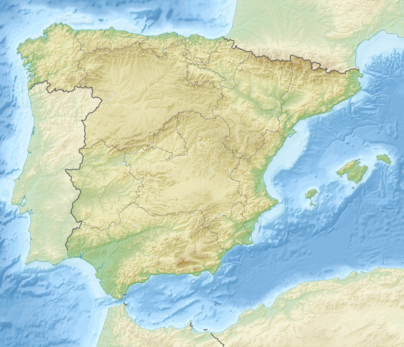
Back Guerra d'o Francés AN حرب الاستقلال الإسبانية Arabic Guerra de la Independencia Española AST یاریم آدا ساواشی AZB Вайна на Пірэнэйскім паўвостраве BE-X-OLD Полуостровна война Bulgarian Brezel Dizalc'hiezh Spagn Breton Guerra del Francès Catalan Španělská válka za nezávislost Czech Rhyfel Iberia Welsh
The Peninsular War (1807–1814) was the military conflict fought in the Iberian Peninsula by Spain, Portugal, and the United Kingdom against the invading and occupying forces of the First French Empire during the Napoleonic Wars. In Spain, it is considered to overlap with the Spanish War of Independence.[e]
The war started when the French and Spanish armies invaded and occupied Portugal in 1807 by transiting through Spain, and it escalated in 1808 after Napoleonic France occupied Spain, which had been its ally. Napoleon Bonaparte forced the abdications of Ferdinand VII and his father Charles IV and then installed his brother Joseph Bonaparte on the Spanish throne and promulgated the Bayonne Constitution. Most Spaniards rejected French rule and fought a bloody war to oust them. The war on the peninsula lasted until the Sixth Coalition defeated Napoleon in 1814, and is regarded as one of the first wars of national liberation. It is also significant for the emergence of large-scale guerrilla warfare.
In 1808, the Spanish army in Andalusia defeated the French at the Battle of Bailén, considered the first open-field defeat of the Napoleonic army on a European battlefield. Besieged by 70,000 French troops, a reconstituted national government, the Cortes—in effect a government-in-exile—fortified itself in the secure port of Cádiz in 1810. The British army, under Arthur Wellesley, the future Duke of Wellington, guarded Portugal and campaigned against the French alongside the reformed Portuguese Army and provided whatever supplies they could get to the Spanish, while the Spanish armies and guerrillas tied down vast numbers of Napoleon's troops.[f] In 1812, when Napoleon set out with a massive army on what proved to be a disastrous French invasion of Russia, a combined allied army defeated the French at Salamanca and took the capital Madrid. In the following year the Coalition scored a victory over King Joseph Bonaparte's army at the Battle of Vitoria paving the way for victory in the war in the Iberian Peninsula.
Pursued by the armies of Spain, Portugal and Britain, Marshal Jean-de-Dieu Soult, no longer getting sufficient support from a depleted France, led the exhausted and demoralized French forces in a fighting withdrawal across the Pyrenees during the winter of 1813–1814. The years of fighting in Spain were a heavy burden on France's Grande Armée. While the French enjoyed several victories in battle, they were eventually defeated, as their communications and supplies were severely tested and their units were frequently isolated, harassed or overwhelmed by Spanish partisans fighting an intense guerrilla war of raids and ambushes. The Spanish armies were repeatedly beaten and driven to the peripheries, but they would regroup and relentlessly hound and demoralize the French troops. This drain on French resources led Napoleon, who had unwittingly provoked a total war, to call the conflict the "Spanish Ulcer".[12][13]
War and revolution against Napoleon's occupation led to the Spanish Constitution of 1812, promulgated by the Cortes of Cádiz, later a cornerstone of European liberalism.[14] Though victorious in war, the burden of war destroyed the social and economic fabric of both Portugal and Spain; and the following civil wars between liberal and absolutist factions ushered in revolts in Latin America and the beginning of an era of social turbulence, increased political instability, and economic stagnation.
Cite error: There are <ref group=lower-alpha> tags or {{efn}} templates on this page, but the references will not show without a {{reflist|group=lower-alpha}} template or {{notelist}} template (see the help page).
- ^ Goya 1967.
- ^ a b c d e Clodfelter 2008, p. 164.
- ^ Chartrand 2000, p. 16.
- ^ Fraser 2008, p. 394.
- ^ a b c d e Clodfelter 2008, p. 166.
- ^ Chartrand 1999, pp. 3–5.
- ^ Gates 2002, p. 521.
- ^ Clodfelter 2008, p. 165.
- ^ Fraser 2008, p. 476.
- ^ a b c d e f g Clodfelter 2008, p. 167.
- ^ Fraser 2008, p. 365.
- ^ Hindley 2010.
- ^ Ellis 2014, p. 100.
- ^ Payne 1973, pp. 432–433.
© MMXXIII Rich X Search. We shall prevail. All rights reserved. Rich X Search

